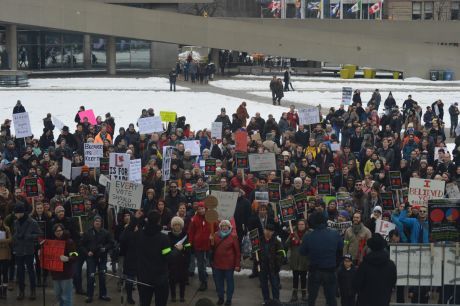Reports
You are here
National day of action on electoral reform

February 14, 2017
On Saturday, February 11, people across Canada demonstrated against Justin Trudeau's broken electoral reform promise. In Toronto the event was staged at Nathan Phillips Square in front of City Hall. The speakers included Alexandra Bravo (Broadbent Institute), Bonnie North (Green Party), Dr. Dennis Pilon of York University, and Kelly Carmichael, executive director of Fair Vote Canada. Following the speakers and rally, the march headed to Yonge-Dundas square, one of the most highly trafficked intersections in the country. Rhythms of Resistance – Toronto lent their staple samba-protest sound to the march, leading with music in front as the energetic crowd of a few hundred chanted through the streets.
Demonstrators upset with Trudeau, First Past the Post
The spoken demands, chants, and signs captured the growing discontent with Justin Trudeau deciding to break his promise that his government would make every vote count. With a majority Liberal Parliament and popular support for electoral reform, there would have been almost no resistance to fulfilling this promise. Memorably immortalized on hand-drawn signs, Trudeau had promised over 1800 times that 2015 would be the last election under the First Past the Post electoral system. Under this system, achieving 39 per cent of the popular vote has resulted in majority governments which effectively have 100 per cent of the power in Parliament.
Many of the signs called out Trudeau and the Liberal Party as liars. One sign caricatured Trudeau's obsession with vapid selfies and another portrayed him as a big-nosed Pinocchio. Others pointed to the fact that under our system, millions of votes are “wasted” or cast for parties and candidates that don't end up represented. Fair Vote Canada circulate placards that showed, for example, Toronto's vote in 2015: 49.3 per cent voted against the Liberals, but the 100 per cent of Toronto's ridings have Liberal MPs. Proportional Representation was by far the most popular system at the demonstration.
False claims
Instead of keeping his campaign pledge, Trudeau has attacked electoral reform on two false fronts: there was no consensus, and Proportional Representation would lead to extremists holding the balance of power. “Do you think Kellie Leitch should have her own party?” he cynically asked a voter in Iqaluit last week. The fact is that Leitch's popular candidacy inside the Conservative party may end up giving her her own party capable of capturing Parliament under First Past the Post.
What Trudeau also fails to recall is that the old Reform Party, a far-right party in its heyday, eventually got their own Stephen Harper to lead a majority government. This was less than a decade after merging into the Conservative Party. Harper's Conservatives then passed draconian national security laws such as Bill C51 and pursued an agenda hostile to progress. Meanwhile, south of the border, a right-wing demagogue sits in the Oval Office partly because the United States' own archaic system is not based on the popular vote. Simply put, under Proportional Representation the Democrats would still control the White House.
The consensus Trudeau seeks was only missing inside the Liberal Party. All the non-Liberal MPs on the all-party electoral reform committee said First Past the Post should be scrapped. In December of 2016 Trudeau himself said he heard “loudly and clearly that Canadians want a better system....of choosing our governments” before doubling down on his electoral reform promise. The Liberals' own ham-fisted survey at MyDemocracy.ca showed 70% per centof Canadians want multiple parties to share governing responsibilities, not one party. Liberal MP Nathaniel Erskine-Smith has admirably gone so far as to publicly rebuke his party for abandoning electoral reform. Trudeau pointing to a lack of consensus is a lazy way to pass the buck to non-existent discord among citizens.
At the same time some see proportional representation as a panacea to guarantee a progressive Parliament. But Harper didn't just rely on First Past the Post, he also relied on Liberal support during his years of minority government, when the Liberals supported repeatedly extending the occupation of Afghanistan and cutting corporate taxes. Last election there was no party providing a voice for the climate justice movement, so even if we had proportional representation we would continue to have a Parliament committed to tar sands pipelines. The problems of Parliament are not just the discrepancy between votes and seats, but between movements and policies. Proportional Representation is a democratic demand, and it needs to be infused with progressive content--like redirecting military spending into healthcare, and investing in a climate justice transition. The NDP can't provide an alternative if it only calls for proportional representation without also campaigning for alternative policies to the wars, climate chaos and austerity of the Tories/Liberals.
Further Action
Trudeau's honeymoon is clearly over, as he's facing anger over supporting pipelines, frustration at townhalls, and upcoming rallies in defence of the free press. By connecting the campaign for proportional representation to other aspects of the Liberal's corporate agenda we can better connect movements and demand alternatives.
NDP MP Nathan Cullen has put forward a petition on the Parliament's website which has already garnered over 115,000 signatures. You can sign the petition here. In addition, Fair Vote Canada continues to organize around the issue in an attempt to pressure the government to enact electoral reform. You can sign their Declaration of Voters' Rights here, as well as take action for Proportional Representation at www.votebetter.ca/.
Section:
Topics:









